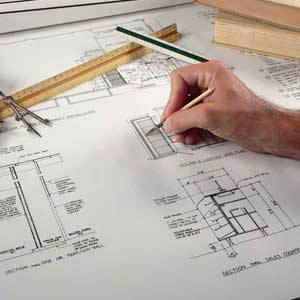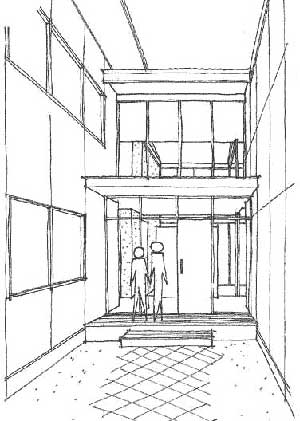Architect
Tasks & duties

Architects may do some or all of the following:
-
examine the proposed building site
-
analyse clients' requirements
-
discuss design ideas, local authority requirements, and constraints with the client
-
create designs and prepare drawings for houses and other buildings
-
specify materials to be used
-
advise clients on building procedures and costs
-
apply for building and resource consents
-
oversee construction projects to ensure plans, budgets and time constraints have been complied with
-
plan exterior spaces and landscaping
-
plan interior decoration
-
run their own businesses
Specialisations
In larger companies, architects may specialise in a specific area such as design, site work or working drawings. They may also specialise in sustainable, conservation or interior architecture.
Skills & knowledge

Architects need to have:
-
knowledge of different styles of architecture
-
knowledge of relevant legislation including the New Zealand Building Code, the New Zealand Building Act, the Resource Management Act and local by-laws, consent procedures and planning regulations
-
knowledge of building methods and materials, including how various materials, such as steel and wood, perform in different situations
-
ability to visualise buildings and spaces (to translate clients' ideas into reality)
-
design and artistic skills, including knowledge of colour theory and texture
-
skill in different drawing and presentation techniques
-
computer skills
-
technical ability
-
knowledge of maths and physics
-
planning and organisational skills
-
good business and communication skills
-
knowledge of various cultures and lifestyles
Entry requirements
To become a registered architect, you need a Bachelor of Architecture, or a Bachelor of Architectural Studies plus a Masters of Architecture (Professional), which are recognised by the New Zealand Registered Architects Board. Both study paths take five years.
After becoming qualified as an architect, you then need to work for 140 weeks before you can apply for registration.
Secondary education
A tertiary entrance qualification is required to enter tertiary training.
The New Zealand Institute of Architects recommends a number of secondary school subjects to help prepare for studying architecture, such as:
-
art and design
-
graphics
-
computer studies and technology
-
environmental studies
-
history
-
geography
-
physics
-
mathematics
-
communications
Tertiary education
There are three accredited architecture programmes in New Zealand all in the North Island:
Victoria University of Wellington offers a five-year Bachelor of Architecture programme. UNITEC (Auckland) and The University of Auckland offer a two-tier architectural programme – a three-year Bachelor of Architectural Studies degree, followed by a two-year Master of Architecture (Professional).
Training on the job
A graduate architect needs to complete 140 hours of on-the-job practical work experience to become a registered architect. This typically takes two to three years.
The New Zealand Registered Architects Board also requires architects to continue their professional development to maintain their registration, which is confirmed every five years. Training is provided by universities, professional organisations, and private providers.
Registration
Architects must be registered with the New Zealand Registered Architects Board (NZRAB). The board requires applicants to:
- hold an architecture qualification recognised by the NZRAB
- complete 140 weeks of practical experience (95 of which must be completed after graduating)
- pass the NZRAB practical experience assessment
Additionally, registered architects need to undertake continuing professional development to maintain their registration.
Useful experience
Useful experience for architects includes design, draughting, building and engineering work.
Related courses
Architecture
Building Science and Technology
For more information, please refer to Career Services.
Document Actions
